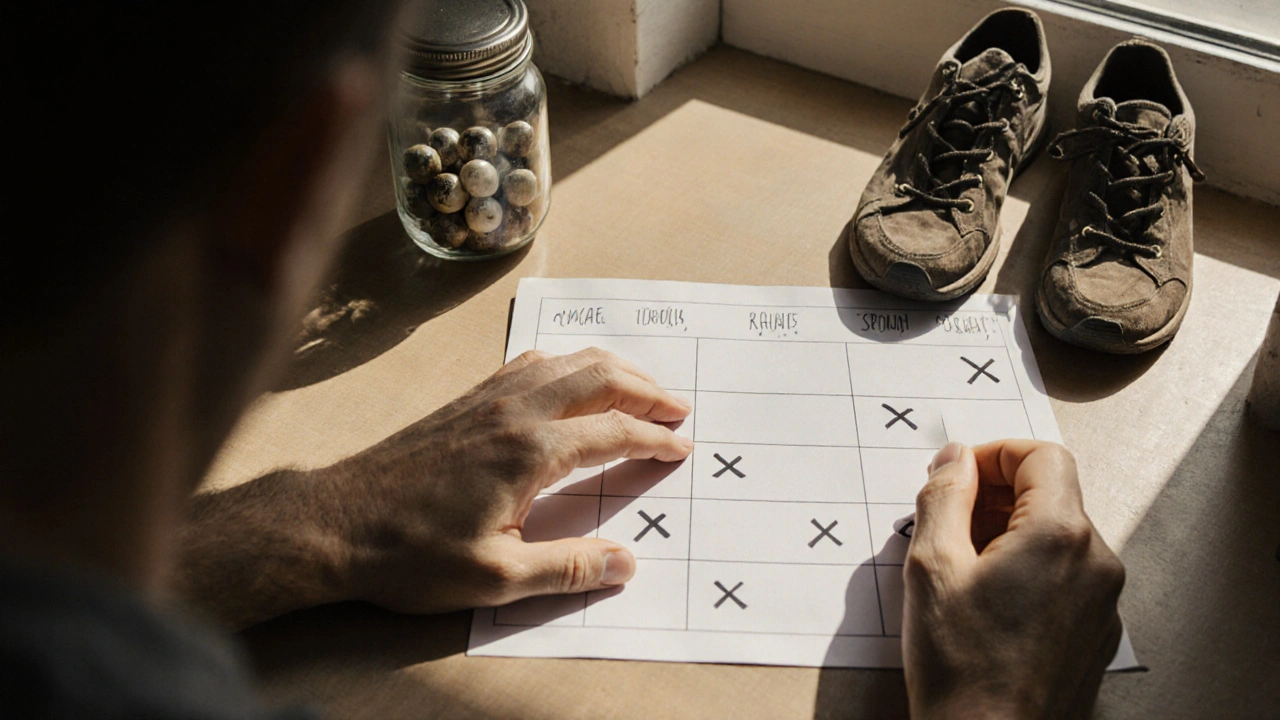Most people set health goals with good intentions-lose weight, get fit, sleep better, eat cleaner-but by February, they’re back to where they started. Why? Because they didn’t set goals that stick. Health goals aren’t about willpower. They’re about systems. And if you’ve tried and failed before, it’s not you-it’s the approach.
Start with why, not what
Before you write down "lose 10 kilos" or "run a 5K," ask yourself: why? What’s the real reason behind the goal? People who succeed don’t just want to look different-they want to play with their kids without getting winded. They want to wake up without hitting snooze five times. They want to feel in control of their bodies, not ruled by fatigue or cravings.Write down your deepest reason. Not the one you think sounds good. The one that makes your chest tighten when you say it out loud. That’s your anchor. When motivation fades-and it will-your why keeps you going.
Make goals specific, measurable, and realistic
"Get healthier" is not a goal. It’s a wish. Real goals have clear boundaries. Instead of "eat better," try: "I’ll eat three servings of vegetables with dinner, five days a week." Instead of "exercise more," try: "I’ll walk 30 minutes after work, Monday to Friday."Use the SMART framework, but skip the jargon. Think simple:
- Specific: What exactly will you do?
- Measurable: How will you track it?
- Attainable: Can you do this without quitting your job or living on kale?
- Relevant: Does this connect to your why?
- Time-bound: When will you start? When will you check in?
For example: "I’ll drink 2 liters of water every day, starting Monday, using a 1-liter bottle I keep on my desk. I’ll mark each bottle with a sticky note when I finish it. I’ll check my progress every Sunday." That’s a goal you can actually live with.
Build habits, not resolutions
Goals are destinations. Habits are the daily steps that get you there. You don’t need to be perfect. You need to be consistent.Start tiny. If you want to start strength training, don’t commit to an hour at the gym. Do two push-ups after brushing your teeth. That’s it. Once that feels automatic, add two more. Over time, those tiny actions stack into real change.
Research from University College London found it takes an average of 66 days for a new behavior to become automatic. Not 21. Not 30. 66. So if you miss a day, don’t quit. Just restart. One missed workout doesn’t ruin your progress. Quitting does.

Track progress without obsession
Tracking helps-but only if it doesn’t become a source of stress. Don’t weigh yourself every day if it makes you anxious. Don’t log every calorie if it turns meals into math class.Find what works for you:
- Use a simple calendar and put an X on each day you hit your goal.
- Take a weekly photo in the same clothes and lighting-progress shows up visually.
- Notice how your clothes fit, how you sleep, how your energy feels.
One client I worked with stopped weighing herself after three weeks of tears. Instead, she started noting how many flights of stairs she could climb without stopping. Within two months, she went from needing to pause on the third floor to running up five without breathing hard. That was her win.
Plan for setbacks
You will slip up. You’ll skip a workout. You’ll eat the whole pack of cookies. It’s not failure. It’s data.Ask yourself: What happened right before I slipped? Were you stressed? Tired? Alone? Hungry? Bored? The trigger is always there. Once you know it, you can prepare.
Build a "Plan B" for every goal:
- If you can’t make your morning walk, do 10 minutes of stretching during lunch.
- If you’re too tired to cook, keep frozen veggies and canned beans on hand for a 10-minute stir-fry.
- If you crave sugar after dinner, keep a cup of herbal tea and a square of dark chocolate ready.
Having a backup plan removes guilt. It turns a slip into a detour, not a derailment.
Surround yourself with support
Your environment shapes your behavior more than your willpower. If your kitchen is full of snacks, you’ll snack. If your phone is your only workout buddy, you’ll skip it.Make healthy choices easier:
- Keep fruit on the counter, not in the fridge.
- Put your walking shoes by the door.
- Turn off notifications during dinner.
- Join a local walking group or online community-people who share your goals keep you accountable.
You don’t need to tell everyone about your goals. But find one person who knows and asks you how it’s going. That small check-in makes a huge difference.

Celebrate small wins
Too many people wait to celebrate until they hit the big goal: "I’ll treat myself when I lose 20 kilos." But by then, you’ve forgotten how far you’ve come.Reward yourself for effort, not just results:
- Finished five days of water goals? Buy yourself a new book.
- Walked every day this week? Book a massage or watch your favorite movie guilt-free.
- Didn’t eat takeout for a month? Treat yourself to a new pair of walking shoes.
These rewards don’t have to cost money. They can be a quiet cup of tea in the morning, 15 minutes of music without distractions, or a walk in the park without your phone.
Revisit and revise
Your health goals aren’t set in stone. Your life changes. Your body changes. Your priorities change.Every six weeks, pause and ask:
- Is this still serving me?
- Do I enjoy this? Or am I doing it because I think I should?
- What’s working? What’s not?
If you hate running but love dancing, switch to dance workouts. If you’re exhausted from meal prepping, try batch-cooking once a week instead. Health isn’t about rigid rules-it’s about sustainable rhythm.
Health is not a destination
The most successful people don’t "achieve" health. They live it. It’s not something you finish. It’s something you practice every day-in small, quiet ways.You don’t need to be perfect. You just need to show up. Even if it’s messy. Even if you’re tired. Even if you only did 10 minutes instead of 30.
That’s how real change happens. Not with a bang, but with a thousand quiet choices that add up.
Start tomorrow. Not Monday. Not next month. Tomorrow. One small step. That’s all it takes.

